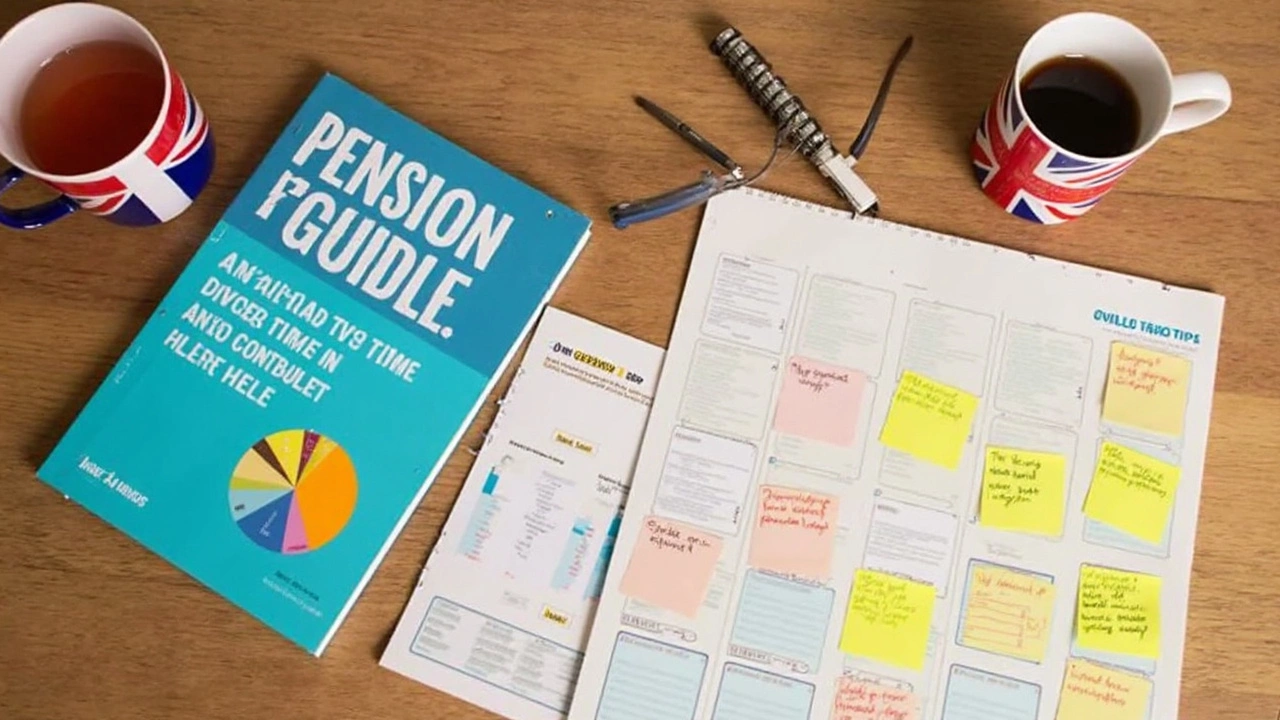If you think all your pension money stays in your pocket, shocker—it doesn’t. Uncle Sam usually wants a cut. Pensions, 401(k)s, and even some Social Security checks sometimes get taxed. It's confusing because some folks get their whole pension taxed, while others skate by with little or nothing owed. So, what gives?
Every pension is different, and what you pay in taxes depends on who paid in, your total income, and even where you live. For example, some states take zero tax from pensions, while others tax nearly every cent. The IRS treats most pensions as regular income, so they’re taxed just like your job used to be. That means bigger pension, bigger bill—unless you plan ahead.
- What Counts as Pension Income?
- How Pension Income Gets Taxed
- Social Security and Retirement Tax Rules
- Ways to Lower Your Pension Tax Bill
- Common Mistakes and FAQs
What Counts as Pension Income?
Lots of people think a pension is just one thing, but it actually covers a bunch of different types of retirement money. Some of these are taxed, some aren't, and a few are kind of in-between. It's smart to know what counts so you don't get surprised when tax time rolls around.
Here’s what usually fits under the term "pension income":
- Traditional employer pensions (those classic monthly checks teachers, police, and company retirees get)
- Private pension plans (from companies, unions, or professional groups)
- 401(k), 403(b), and 457(b) withdrawals
- Individual Retirement Account (IRA) withdrawals—traditional IRAs, not Roths
- Military, federal, and state government pensions
- Certain annuity payments, if you bought one with pre-tax dollars
Most people also want to know about Social Security. Is that pension income? The IRS doesn’t lump it with pensions, but since it shows up in retirement, it gets pulled into the mix. Sometimes Social Security benefits are taxable, but they have their own unique rules (more on that later).
Now, a key question: how do these sources compare when it comes to taxes? Check out the quick comparison below:
| Source | Taxable? | Special Notes |
|---|---|---|
| Traditional Employer Pension | Usually Yes | Taxed as ordinary income |
| 401(k)/403(b)/457(b) Withdrawals | Yes | All money is taxable unless you paid in after-tax money |
| Traditional IRA Withdrawals | Yes | Unless you made non-deductible contributions |
| Roth IRA Withdrawals | No | Tax-free if conditions met (account held 5+ years, age 59½+) |
| Social Security | Sometimes | Depends on total income |
| Annuities (pre-tax purchase) | Yes | Taxed on the gains/earnings |
The most important thing: the pension income you get in retirement is usually considered regular taxable income. That means it piles on top of any other money you make, so you could end up in a higher tax bracket. Knowing exactly what counts gives you a jump start on planning for a smaller tax bill.
How Pension Income Gets Taxed
When it comes to tax time, not all retirement payments work the same. Most folks get monthly checks from a traditional pension, or maybe payouts from a 401(k) or IRA. If you didn’t pay tax on that money before, you’ll likely pay tax now. The IRS sees most pension income as regular income, just like job pay, so it gets taxed at your normal rate. Your tax bracket can go up or down based on your total income in retirement, not just your pension.
If you contributed after-tax dollars to your pension plan, only the portion that came from earnings or pre-tax money gets taxed. For example, if you paid in $30,000 after taxes during your working years, that chunk comes back tax-free. Everything else—investment growth and employer contributions—gets taxed.
Here’s the big catch: your pension provider usually takes out federal income tax before sending your check, a process called withholding. But they rarely get it perfect. It’s up to you to make sure enough gets held back—or else you could owe when you file. States have their own rules, and some tax your pension while others don’t touch it. As of last year, places like Florida, Texas, and Nevada skip state taxes on pensions. On the flip side, California and New York can take a bite.
- Pension payments from government jobs (like military or teacher pensions) usually get taxed, too—unless you live in a state that exempts them.
- Early withdrawals before age 59½ often come with a 10% penalty on top of income tax, unless you qualify for an exception (like permanent disability).
- Some pensions, such as Roth IRAs, are usually tax-free in retirement—but only if you follow the rules about how long you’ve had the account.
The paperwork matters. Your plan will send you a Form 1099-R every January to show what you got—and what was withheld. Ditching or losing this form can be trouble, so keep it safe. Don’t just rely on the check in your mailbox; check how much is being withheld now so you don’t get slammed by a surprise tax bill next April.

Social Security and Retirement Tax Rules
Here’s the straight deal: Social Security isn’t always tax-free. The IRS sets some clear rules, but honestly, it’s your total income—not just your Social Security—that tips the scale. If you’re living off only Social Security, you probably won’t owe taxes. But once you add in a pension, 401(k), IRA withdrawals, or anything else, that tax bill can show up fast.
The magic number? It’s called your "combined income"—that’s your adjusted gross income, plus nontaxable interest, plus half your Social Security benefits. If that total tops $25,000 for single filers or $32,000 for joint filers (married), you could owe taxes on up to 85% of your Social Security. Yes, really—85%. The actual chunk that’s taxed varies a lot, so it can help to look at the IRS worksheet or run your own numbers every year.
- If your combined income is below $25,000 (single) or $32,000 (married), your Social Security usually stays tax-free.
- For singles making between $25,000 and $34,000, up to 50% of benefits can be taxed. Above $34,000, it jumps to 85%.
- For couples filing jointly, those jump points are $32,000 and $44,000.
Your pension income is a different story—most regular pensions are taxed as ordinary income at your current rate. But state taxes are trickier: some states skip taxing Social Security, others hand out big pension exemptions, and a few tax everything. It’s worth checking your state’s rules every year, because some tweak them often.
One pro tip: if you’re close to those IRS cutoffs, you can time withdrawals from your retirement accounts, like a 401(k) or IRA, to stay under the line and lower your overall tax hit. Little changes—like spacing withdrawals or taking more one year, less the next—can make a surprising difference over time.
Ways to Lower Your Pension Tax Bill
Worried about how much tax you’ll owe on your pension? You’re not stuck paying top dollar—there are tricks that really work. The main thing is to plan ahead and know the loopholes that actually save people money every year.
- Delay withdrawals when you can. If you don’t need the money right away, holding off on pension payouts keeps your taxable income lower for that year. Waiting to tap certain pensions, like traditional IRAs or 401(k)s, lets your money grow and can bump you into a lower tax bracket the next year.
- Move to a tax-friendly state. Not every state taxes pension income. States like Florida, Texas, and Nevada don’t tax most retiree earnings. Just checking where you live can mean more cash stays with you.
- Use Roth accounts if possible. Early planning here pays off. Roth IRAs and Roth 401(k)s are funded with after-tax dollars, so you don’t owe federal taxes on qualified withdrawals—ever. It’s a huge win for retirees who prepped in advance.
- Keep your income under the radar. Some tax credits and breaks phase out if your income is too high. For example, those paying Medicare premiums may owe surcharges if their retirement income is over certain IRS limits. Spread withdrawals across years, or mix taxable and nontaxable payouts to keep under the line.
- Don’t skip the standard deduction. The IRS lets most retirees (especially those over 65) claim a bigger deduction, which knocks down taxable income before you ever see the tax bill.
Here’s how much state taxes can sting, just to compare:
| State | Pension Income Tax Rate |
|---|---|
| California | Up to 12.3% |
| Illinois | 0% (pension income exempt) |
| Texas | 0% (no state income tax) |
| New York | Up to 8.82%, some pension exclusions apply |
Watch out for under-withholding too. If not enough taxes come out of your pension check, you could get a nasty surprise at tax time. Most providers let you update withholding instructions so you don’t get stuck owing big bucks in April. Tweak it once a year to keep pace with what you actually owe.
Remember, every little step adds up. A little planning can knock down your tax bill and help you keep more of your hard-earned pension income.

Common Mistakes and FAQs
Pension taxes trip people up all the time, so let’s call out the classic mistakes you can actually do something about. The most common blunder? Folks just assume their pension isn’t taxed and get surprised with a bill. That’s a rough wake-up call if you’re on a fixed income.
- Pension income is usually taxed at your regular income tax rate, just like your old paycheck. But a lot of people forget this, especially if they move to a state with different rules.
- Another mistake: not withholding enough from pension checks. If you skip this step, you might owe more at tax time or face penalties.
- People also miss that Social Security can be taxed if your total retirement income is high enough—so those checks aren’t always “tax-free.”
- Relying on rumors or outdated advice. Tax laws change. Something your neighbor told you five years ago might not be true in 2025.
Now for some quick FAQs:
- Do all states tax pension income? Nope. States like Florida, Texas, and Washington don’t tax it. Others, like California and New York, do.
- Can I lower my pension taxes? Sometimes. Moving to a tax-friendly state, using deductions, or making IRA rollovers can help.
- Is my entire pension always taxable? Not always. If you paid into the plan with after-tax dollars, a slice might be tax-free. But if it’s from pre-tax income, expect taxes on the whole amount.
- Will I get a tax statement for my pension? Yes. Look for Form 1099-R in your mailbox every January. Don’t throw it out!
If you’re lost, talking to a tax pro for a quick checkup is way better than facing a surprise bill next April.
